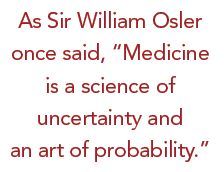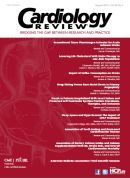Cardiology Fellowship: Fun and Games, or Life in a Pressure Cooker?

Karla K. Quevedo, MD
Resident's Coner
The term “cardiology” derives from the Greek word “καρδιά,” transliterated as “kardia,” and meaning “heart” or “inner self.” Since 1628, when Dr William Harvey first described blood circulation to Shumway and colleagues at Stanford, cardiology as a medical specialty has dealt with more than simply disorders of the heart; it also includes diseases or conditions that affect blood vessels. Therefore, the specialty has expanded to cover the study of cardiovascular health, better reflecting the true scope of the field.

Cardiology is a specialty that has seen some of the most revolutionary medical advances to have occurred in the last century. Dr Christiaan Barnard’s performance of the first human heart allograft operation in Cape Town, South Africa, in 1967, easily comes to mind, and we can also cite 1982 and 1986 as hallmark years that gave us the first artificial heart and the first coronary stent, respectively. These are only a few of the advances that we have seen in this specialty; there are many innovations in
medications and other treatments, such as the human embryonic stem cell that was first used to successfully repair and, essentially, “regrow” human heart tissue in a laboratory.
From the early days until the present time, and even as I am writing this article, cardiology is dynamically changing. It is a field that embodies a unique mix of hands-on practical application associated with physiological principles, supported by rich and continually evolving evidence-based practice. As cardiologists we have to pursue all of this new knowledge. It is a never-ending learning experience, but the reward is also very gratifying: to be able to change the prognosis and life expectancy related to our patients’ cardiovascular diseases. It’s worth the effort. As Sir William Osler once said, “Medicine is a science of uncertainty and an art of probability.” We can learn all the latest and available technology, but many of the chronic diseases that affect humanity remain incurable, so uncertainty is a word that we always have in our minds when we start treating our patients.
The time has come for me to finish my residency in Internal Medicine. After 3 brief and stimulating years, it is time to start a new phase in my professional life. It seems like yesterday that I had my first interview with a patient or performed my first procedure. I can say now that after 3 years of continuous training, I have gained a great deal of knowledge and experience. Finally, during my third year as a Resident, I began to feel confident providing inpatient and outpatient care.
Thankfully, I was lucky to have the support of my faculty, who were always by my side to guide me along this journey. Now is the time to start walking by myself, and to take full responsibility for my medical decisions—something that is exciting but that also represents a big challenge. My peers and I, as recently graduated doctors of Internal Medicine, are ready to take different pathways in our careers. I consider myself lucky to have taken the one path that has excited me the most since I first began to study medicine: cardiology. Murmurs, hemodynamics, cardiovascular pathophysiology, and electrocardiograms have always been very appealing topics to me. Cardiology has become an important part of my family’s personal experience because, unfortunately, my father had a myocardial infarction many years ago and is now faced with heart failure and waiting for a heart transplant. I have personally witnessed how, thanks to all the advances in cardiovascular medicine, my father is now stable. He has become the greatest inspiration for me to continue in this career.
The internist phase of my training has finished; now I will open the door to a whole new and different world of cardiovascular health. The time has arrived to start the training to perform procedures, treat arrhythmias, repair “broken” hearts, and treat valvular diseases, just to name some of the skills to be acquired as a training fellow.
The lifestyle of a cardiologist is hence an interesting topic. Do cardiologists have more fun? According to the Pew report in 2006, 34% of Americans say that they are “very happy,” 50% “pretty happy,” and 15% “not too happy.”1 Medscape’s Physician Lifestyle Report 2012 asked US physicians how happy they were with their lives outside of medicine and to rate their level of happiness on a scale of 1 to 5.2 The average happiness score for physicians who responded was 3.96, which is on the cheerful side. However, cardiologists were less happy than the average physician, with a score of 3.92, tenth from the bottom of the specialty list. Their closest neighbors in misery/happiness were nephrologists, diabetologists, and critical care physicians, who—perhaps coincidentally—treat many of the same chronic illnesses.
What about physical health? Cardiologists are considered among the healthiest specialists, along with plastic surgeons, endocrinologists, orthopedists, and hematologists. So, as contradictory as it sounds, cardiologists are more depressed but physically healthier compared with other specialties. Depression levels are likely related to the level of stress and long hours of working that this specialty demands.
I aspire to have a career in cardiovascular medicine in spite of all of the stress and continuous training that it implies. I am looking forward to a wonderfully expansive specialty with ample opportunity to do meaningful research, in both academia and clinical practice. The rewards will definitely be invaluable. To have the opportunity to help people, to be challenged, and to learn throughout my life—what else could I ask for?
I close with a quotation of Voltaire’s, which reflects my admiration and respect for this noble profession of medicine: “Men, who are occupied in the restoration of health to other men, by the joint exertion of skill and humanity, are above all the great of the earth. They even partake of divinity, since to preserve and renew is almost as noble as
to create.”
References
1. Pew Research Center. Are We Happy Yet? Washington, DC, 2006. pewresearch.org/pubs/301/are-we-happy-yet. Accessed July 12,2012.
2. Medscape. Medscape Physician Lifestyle Report 2012. http://www.medscape.com/features/slideshow/lifestyle/2012/public. Accessed July 12, 2012.
